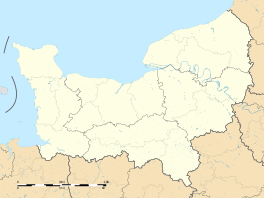Bricquebec
| Bricquebec | ||
|---|---|---|

Château de Bricquebec
|
||
|
||
| Coordinates: 49°28′00″N 1°38′00″W / 49.4667°N 1.6333°WCoordinates: 49°28′00″N 1°38′00″W / 49.4667°N 1.6333°W | ||
| Country | France | |
| Region | Normandy | |
| Department | Manche | |
| Arrondissement | Cherbourg | |
| Canton | Bricquebec | |
| Intercommunality | Cœur du Cotentin | |
| Government | ||
| • Mayor (2008–2014) | Henri-Louis Védie (PR) | |
| Area1 | 32.66 km2 (12.61 sq mi) | |
| Population (2009)2 | 4,252 | |
| • Density | 130/km2 (340/sq mi) | |
| Time zone | CET (UTC+1) | |
| • Summer (DST) | CEST (UTC+2) | |
| INSEE/Postal code | 50082 /50260 | |
| Elevation | 7–161 m (23–528 ft) | |
|
1 French Land Register data, which excludes lakes, ponds, glaciers > 1 km² (0.386 sq mi or 247 acres) and river estuaries. 2Population without double counting: residents of multiple communes (e.g., students and military personnel) only counted once. |
||
1 French Land Register data, which excludes lakes, ponds, glaciers > 1 km² (0.386 sq mi or 247 acres) and river estuaries.
Bricquebec is a former commune in the Manche department in Normandy in northwestern France. On 1 January 2016, it was merged into the new commune of Bricquebec-en-Cotentin.
As revealed by the etymology of its name, the origin of Bricquebec (from the Scandinavian bekkr, a course of water; in turn from brekka, slope) is connected to the Viking colonisation of the Cotentin Peninsula at the beginning of the 10th century. Tradition attributes the foundation of the château to the Norman, Anslech. The dukes of Normandy made Bricquebec one of their strongholds.
Bricquebec is twinned with:
Inhabitants are referred to as Bricquebétais.
...
Wikipedia



